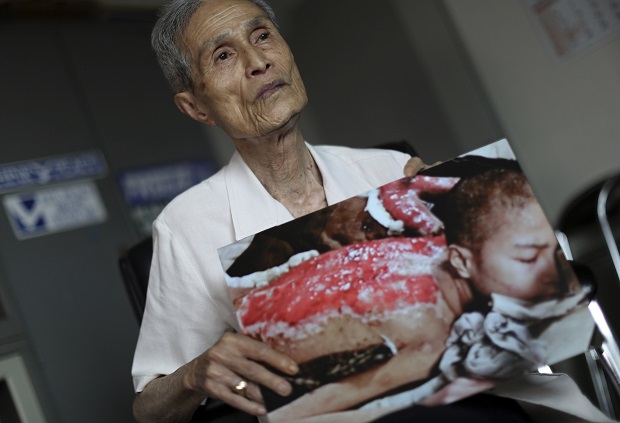Nagasaki to mark 70th anniversary of atomic bombing

In this June 30, 2015 photo, Sumiteru Taniguchi, 86, a survivor of the 1945 atomic bombing of Nagasaki, shows a photo of himself taken in 1945, during an interview at his office in Nagasaki, southern Japan. For 70 years, Taniguchi, chair of the Nagasaki Atomic Bomb Survivors Council, has lived a web of wounds covering most of his back, and the remains of three ribs that half rotted away and permanently press against his lungs, making it hard to breathe. His wife still applies a moisturizing cream every morning to reduce the irritation from the scars. AP
TOKYO, Japan – Japan on Sunday marks the 70th anniversary of the atomic bombing of Nagasaki that claimed tens of thousands of lives in one of the final chapters of World War II.
Memorial services are planned in the now bustling port city with Prime Minister Shinzo Abe and US ambassador Caroline Kennedy expected to attend.
Bells will toll as ageing survivors, the relatives of victims and others remember the devastating blast at 11:02 am local time (0202 GMT) on August 9, 1945.
About 74,000 people died in the initial blast near a major arms factory from a plutonium bomb dubbed “Fat Man”, or from after-effects in the months and years following the bombing.
The attack on Nagasaki came three days after American B-29 bomber Enola Gay dropped a bomb, dubbed “Little Boy”, on Hiroshima, the first atomic bombing in history.
Article continues after this advertisementNearly everything around it was incinerated by a wall of heat up to 4,000 degrees Celsius (7,200 degrees Fahrenheit) — hot enough to melt steel.
Article continues after this advertisementAbout 140,000 people are estimated to have been killed in the Hiroshima attack, including those who survived the bombing itself but later died from radiation sickness.
Gums bled, teeth fell out, hair came off in clumps; there were cancers, premature births, malformed babies and sudden deaths.
The twin bombings dealt the final blows to imperial Japan, which surrendered on August 15, 1945, bringing an end to World War II.
While some historians say that they prevented many more casualties in a planned land invasion, critics counter that the attacks were not necessary to end the war, arguing that Japan was already heading for imminent defeat.
At memorial ceremonies in Hiroshima on Thursday, Abe said Japan would submit a fresh resolution to abolish nuclear weapons at the UN general assembly later this year.
“As the only country ever attacked by an atomic bomb… we have a mission to create a world without nuclear arms,” he told the crowd.
“We have been tasked with conveying the inhumanity of nuclear weapons, across generations and borders.”
This year’s memorials come days ahead of the scheduled restart of a nuclear reactor in southern Japan — the first one to go back on line after a two-year hiatus following the tsunami-sparked disaster at Fukushima in 2011.
While Abe has pushed to switch reactors back on, public opposition remains high after the worst nuclear accident since Chernobyl in 1986.
Japan’s nationalist leader has also been criticized for efforts to expand the role of his pacifist country’s Self-Defense Forces, changes that open the door to putting troops into combat for the first time since the war.
A constitution imposed by US occupiers after the war prevented Japan’s military from engaging in combat except in self-defense.